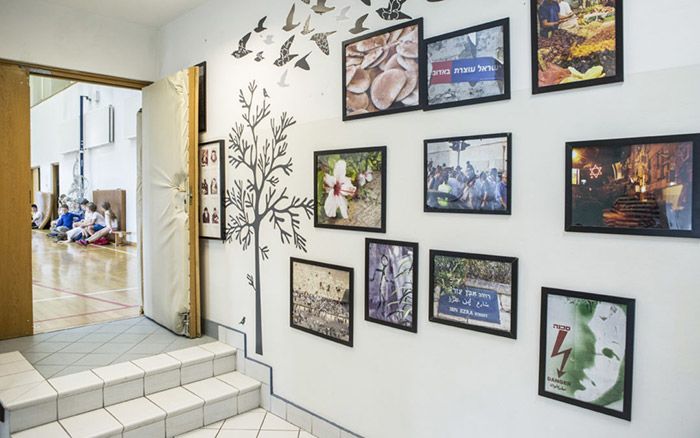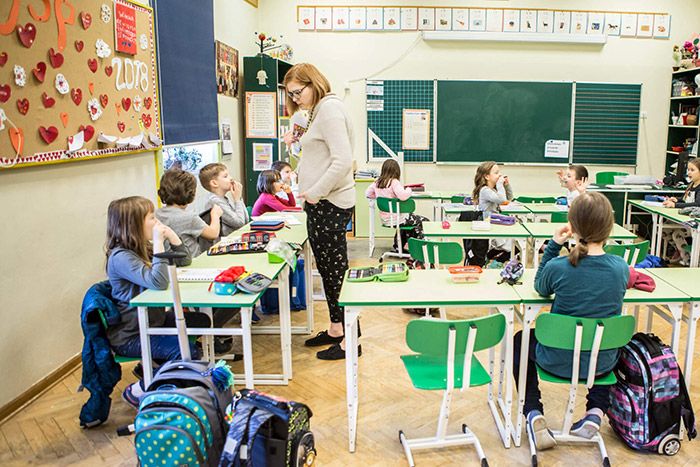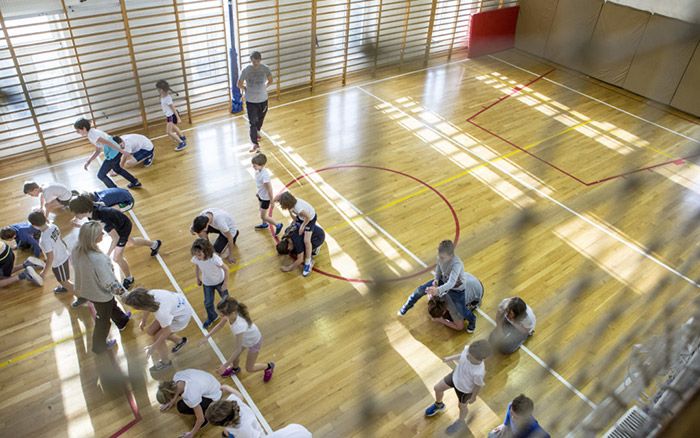On this page:
- School history
- Language education
- Plans for growth
- Curriculum
- Students
- Teachers
- The uniqueness of the school
- Achievements
- Challenges
School history
Our Kids: Your school is one of over a dozen European schools run by the American Ronald Lauder Foundation. What does this mean in practice?
Karolina Szykier-Koszucka: The Lauder Foundation supports schools in various places around the world, mainly elementary schools. It was the founder of our school. First, the kindergarten was established on the parents' initiative, and then the foundation created the school. This doesn’t mean, however, that we are a typical network school. The foundation acts as an educational advisor through a number of additional programs that support our staff, not only in the field of Jewish education, but also the implementation of new technologies. It also gives us contact with all the foundation's schools and the possibility of mutual visits. This year we started an exchange with a school in Budapest—we visited it in October and were looking forward to a return visit, but it had to be canceled due to the coronavirus.
Our Kids: Are there more Jewish schools like yours?
Karolina Szykier-Koszucka: Ours is the only Jewish school in Warsaw. The kindergarten was established in 1989, and the school in 1994, when preschoolers reached school age. There is one more Jewish school in Wrocław.
Language education
Our Kids: Please tell me about the language training at your school. Children learn Hebrew?
Karolina Szykier-Koszucka: Yes, they start learning Hebrew in kindergarten. At this stage, of course, this is in the form of play: games, songs—language immersion. We continue teaching Hebrew throughout primary school for three hours a week, until Grade 3, and then we reduce the number of hours when we start teaching other foreign languages from Grade 4 in addition to the main language, which is English. We have our own teachers, but native speakers also teach Hebrew. We also cooperate with the World Zionist Organization, which helps us by providing native speakers, and with Israelis living in Poland who run conversation classes. We don't teach any subjects in Hebrew—we teach it as a foreign language.
Our Kids: What other languages do you offer and what level do children reach in them?
Karolina Szykier-Koszucka: We also teach German, Spanish, and French. After completing Grade 8, children speak English fluently. We have international exchange programs, and we have guests who come to our school and have classes in English with higher grades, without interpreters. When it comes to Hebrew, it is different—we have Polish and Israeli children who also learn Hebrew at home. Hebrew is mandatory for everyone. We try to raise its level and grow every year. That’s why we introduce new methods and technologies, and look for new textbooks. From Grade 4 we teach an additional language two hours a week. Spanish, taught by a native Spanish teacher, is very popular.

Plans for growth
Our Kids: You had a middle school, but due to the reform that eliminated middle schools, you’re opening your own high school.
Karolina Szykier-Koszucka: Yes, we are starting in September 2020. Recruitment is currently underway. There’s a lot of interest in our high school, which we believe will be very strong. We have a wonderful principal and great teachers, and on March 3 there was an open day. There was also a lot of interest in our high school during the Our Kids Expo.
We are planning to open two first grades, for which we have enough space in our current building. We’ll renovate this space and adapt it for older students to make it more home-like. In our high school, we’ll be focusing on the development of interpersonal relations, on introducing innovations and new methods developed at Columbia University. For example, tutoring will be very important. We’ll also apply the methods of Jewish education used in Jewish schools for many years and more broadly in Jewish education, such as the pair discussion called chevwr, used in the teaching of the Talmud for centuries.
It has been described scientifically as a great method for acquiring in-depth knowledge about the topic and developing skills of asking questions, for project activities when learners work together. We’ll build an attitude of cooperation and activism, which is very important in the Jewish tradition. Charity, volunteering, and ecology are important to us. We do it, of course, already in primary school, but in high school we’ll make it a special focus, because older students can act more independently and carry out many projects on their own.
Curriculum
Our Kids: What core curriculum do you implement in your school?
Karolina Szykier-Koszucka: The Polish core curriculum.
Our Kids: Is the school secular or religious?
Karolina Szykier-Koszucka: From nursery to high school we are a secular and coed facility. Of course, the school calendar is largely subordinated to the Jewish one—we celebrate Jewish holidays and Shabbat. We teach Jewish culture and history, but not religion, and we’re not affiliated with any denomination of Judaism. All children are welcome, both from the small Warsaw Jewish community and from the non-Jewish community. It’s only natural for children who study together to be different from each other. And this is one of the greatest advantages of our school—this natural cultural diversity, which is our daily life, and no one notices these differences at all, because together we create something more important—our school community.
Our Kids: What is your school day like?
Karolina Szykier-Koszucka: Every day children are at school from 8:30 a.m. to 2:30 p.m., because we have seven teaching hours in Grade 1. It’s necessary because we have additional subjects and languages.
The after-hours care is included in tuition. From 2:30 to 5:30 p.m., we offer various sports and art activities, meetings with teachers, consultations, as well as various clubs. There’s also the option of playing freely in the room, on the playground, or in a quiet zone in the library, where children can read and do their homework.

Students
Our Kids: Who are your students?
Karolina Szykier-Koszucka: There are roughly half Jewish and half non-Jewish children. Among Jewish students, there are children from religious (Orthodox and Reformed) and secular families, as well as from families completely unrelated to the Jewish community, for whom being at school is the only contact with Jewishness. Through this everyday experience, as well as Jewish culture lessons and informal learning, children have an excellent opportunity to participate in Jewish life in Poland. A graduate of our school is undoubtedly an invaluable source of knowledge about Jewish traditions and knows well how easy it is to function in such a mixed community.
Our Kids: What causes parents who do not have Jewish roots to send their children to your school?
Karolina Szykier-Koszucka: The greatest value of our school is our close-knit community and focus on relationships, the fact that we know all children and no one is anonymous. The secret ingredient is this family factor, because children from the Jewish community know each other not only from school, but also from family camps, vacations, synagogues, social gatherings, and we transfer this familiarity, mutual support and attention to everyone.
Each child is an important individual for us. We focus on their problems, which appear as in every school, and celebrate their successes. Another important ingredient of the school experience is our wonderful psychologist who has been with us for two years. Children are always welcome in her office, she’s in contact with children on a daily basis and knows perfectly well what’s happening in each class. We currently have 10 classes. Many elements contribute to building a safe atmosphere in our school.
Our Kids: Do you have any special needs children in your school?
Karolina Szykier-Koszucka: Yes, and we also have two teachers who work with children who require extra attention and work after school. We have a dedicated team that works with children with special educational needs. In our small school, children with various challenges feel better and safer.
Teachers
Our Kids: Who are your teachers?
Karolina Szykier-Koszucka: They are mainly Poles, but we also have Israelis. We have a permanent teaching staff that does not change much, which makes us very happy. The new teachers who joined us are really great, such as the new Polish teacher who joined us two years ago or the new math teacher. We ‘re very lucky to find such great people who fit in perfectly with our team. We have teachers who have been with us since the very beginning.
The uniqueness of the school
Our Kids: What is special about your school?
Karolina Szykier-Koszucka: A very important feature of our school is its small scale. And an education open to differences. There’s no uniformity, but openness to others. We have a project concentrating on refugees or homeless people and this openness to diversity is something completely natural for kids. Therefore, it’s easy to implement such projects and move them to the next levels. Multiculturalism is a very important element, and many families seek such openness for various reasons—they can be Orthodox or non-religious people, or vegetarians, because in our school we run vegetarian, kosher, and dairy, and therefore meat-free cuisine.

Achievements
Our Kids: What are you most proud of? What are your greatest achievements?
Karolina Szykier-Koszucka: We are a school that does not focus on rankings. We focus on the students and their needs, and the greatest satisfaction for us is when we see how our students change and do well, make progress, and how our support pays off. We’re happy to see that the children who come to us from other schools are really happy, and parents say that after the first days you can see a change: they are under less stress and are eager to attend school.
Ours is a stress-free and friendly school. We all enjoy the additional activities our students are involved in, their working on their own projects as part of a talent show, dance or poetry presentation, literary or photography competition, and many more. We all look forward to spending Christmas together, to fun and games, during which we see how the whole school is integrated, regardless of the students’ age, and how all kids like each other. This is, in our view, our educational success—building a community, a safe space. And even when conflicts arise, everyone knows how to solve them, or who to go to for help. A lot can be achieved in such an atmosphere.
Challenges
Our Kids: What are your challenges or problems?
Karolina Szykier-Koszucka: Certainly the challenge (which we turn into our advantage) is that we have different children—Jewish, non-Jewish, Polish, religious, and non-religious. Finally, the overloaded curriculum is a challenge, which is a common problem in today's schools. It’s not easy for our teachers to ensure their teaching is effective without the kids feeling overburdened, losing their enthusiasm to learn, and leaving time for their other passions. That’s why we limit the amount of homework assigned in subjects that don’t lead to exams so that children have time for their own activities and developing their passions. We have also created a special space for this in the lesson plan—a subject called Academy of Interest Development.
People who read this also viewed:
-
Advice Guide
- ABC of educational terminology: Glossary of terms and concepts
- The admissions process
- Advantages and disadvantages of studying in an international school
- The application process
- Benefits of Polish private schools
- Bilingual schools
- Boarding schools
- Choosing a private or nonpublic school in Poland
- Compare schools in Poland
- English schools in Warsaw
- Homeschooling
- International schools in Kraków
- International schools
- Private school interviews
- Music education
- Myths about private education
- Non-public schools in Poland
- School open houses
- Our Kids Interview: Get to know EF Academy Oxford
- Our Kids Interview: Get to know Open School
- Our Kids interview: Get to know Regent College International Schools
- Our Kids Interview: Get to know The American School of Warsaw
- Our Kids Interview: Get to know The British School Warsaw
- Our Kids Interview: Get to know Wrocław Cosmopolitan School (two interviews, new video)
- Poland school profiles
- Private day schools
- Gifted schools & programs
- Private Jewish schools in Poland
- Language schools
- Private school tuition and costs in Poland
- Private schools in Poland
- Private schools in Poland offering French-language immersion
- English immersion schools
- Poland school uniforms
- Private special needs schools in Warsaw
- Public versus non-public schools in Poland
- Private school questions
- Private school rankings
- Reasons for choosing private schools - Our Kids’s survey report
- Religious schools
- Schools and classes for children with ADHD in Poland
- Social primary schools
- Social Schools
- Special educational needs (SPE) certificates
- Special needs schools
- Study abroad at a private school
- The first annual non-public school fair in Poland
- The first annual Our Kids non-public school expo in Warsaw was a great success
- Third Private School Expo in Warsaw - summary
- Types of schools
- Types of schools in Warsaw
- Warsaw preschool costs
- Why private school?
- Why parents go private
-
Grades
- Boarding high schools
- Choosing a high school in Poland
- Mokotow High School Campus - a new Warsaw high school and Thames British School campus
- Montessori nursery schools
- Montessori preschools
- Our Kids Interview: Get to know English Montessori School Katowice
- Our Kids Interview: Get to know FSA School
- Our Kids Interview: Get to know KIDS & Co.
- Our Kids Interview: Get to know Polish British Academy of Warsaw
- Our Kids Interview: Get to know The English Playhouse and The English Primary
- Poland education: grade levels
- Preschools in Warsaw
- Private & non-public preschools
- Private & non-public primary schools
- Private bilingual elementary schools in Warsaw
- Private high schools
- Private high schools in Warsaw
- Private middle schools
- Nursery schools
- Private primary schools in Warsaw
- Social high schools
-
Locations
- Boarding schools in Warsaw
- English schools in Kraków
- International Baccalaureate (IB) schools in Warsaw
- International schools in Warsaw
- Montessori schools in Warsaw
- Non-public schools in Warsaw
- Our Kids Interview: Get to know EF Academy
- Our Kids interview: Get to know Excellence in Education better
- Our Kids Interview: Get to know PRIMUS Non-Public Primary School No. 47 and Non-Public Secondary School
- Our Kids Interview: Get to know the Canadian School of Warsaw
- Our Kids Interview: Get to know The Primary and Secondary Schools of the Sisters of Nazareth in Warsaw
- Private Catholic and Christian schools in Warsaw
- Private day schools in Warsaw
- Private language schools in Warsaw
- Private schools in Bialystok
- Bydgoszcz schools
- Częstochowa schools
- Private schools in Gdańsk & Gdynia
- Katowice schools
- Private schools in Krakow
- Lublin schools
- Olsztyn schools
- Private schools in Poznań
- Private schools in Rzeszów
- Szczecin schools
- Private schools Warsaw
- Private schools in Wrocław
- Zielona Góra schools
- Private schools in Łódź






 POL
POL CAN
CAN